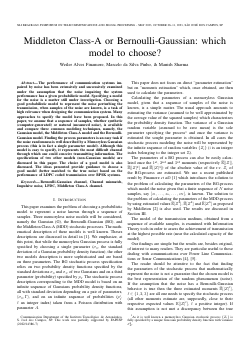
Middleton Class-A or Bernoulli-Gaussian: which model to choose?
Weiler A. Finamore, Marcelo S. Pinho, Manish Sharma
DOI: 10.14209/sbrt.2023.1570920087
Evento: XLI Simpósio Brasileiro de Telecomunicações e Processamento de Sinais (SBrT2023)
Keywords: Bernoulli-Gaussian Channel Channel mismatch Impulsive noise Middleton class A channel
Abstract
The performance of communication systems impaired by noise has been extensively and successively examined under the assumption that the noise impairing the system performance has a given probabilistic model. Specifying a model for the noise is a matter still under investigation. Choosing a good probabilistic model to represent the noise perturbing the transmission, when samples of the noise are known, is a task of high relevance when designing the communication system. Many approaches to specify the model have been proposed. In the current paper we consider that a sequence of samples, synthetic (computer generated) or natural (measured noise) is available and compare three common modeling techniques, namely, the Gaussian model, the Middleton Class-A model and the Bernoulli-Gaussian model. Finding the process parameters is an easy task if the noise randomness is well described by a Memoryless Gaussian process (this is in fact a single parameter model). Yet easy to specify this model is the hardest channel to transmit information through that one can think of. The specification of other two models (non-gaussian models) are discussed in the current paper. The choice of a good model is also discussed. The ideas presented provide guidance to choose a good model (better matched to the true noise) based on the performance of LDPC coded transmission over BPSK systems.Download